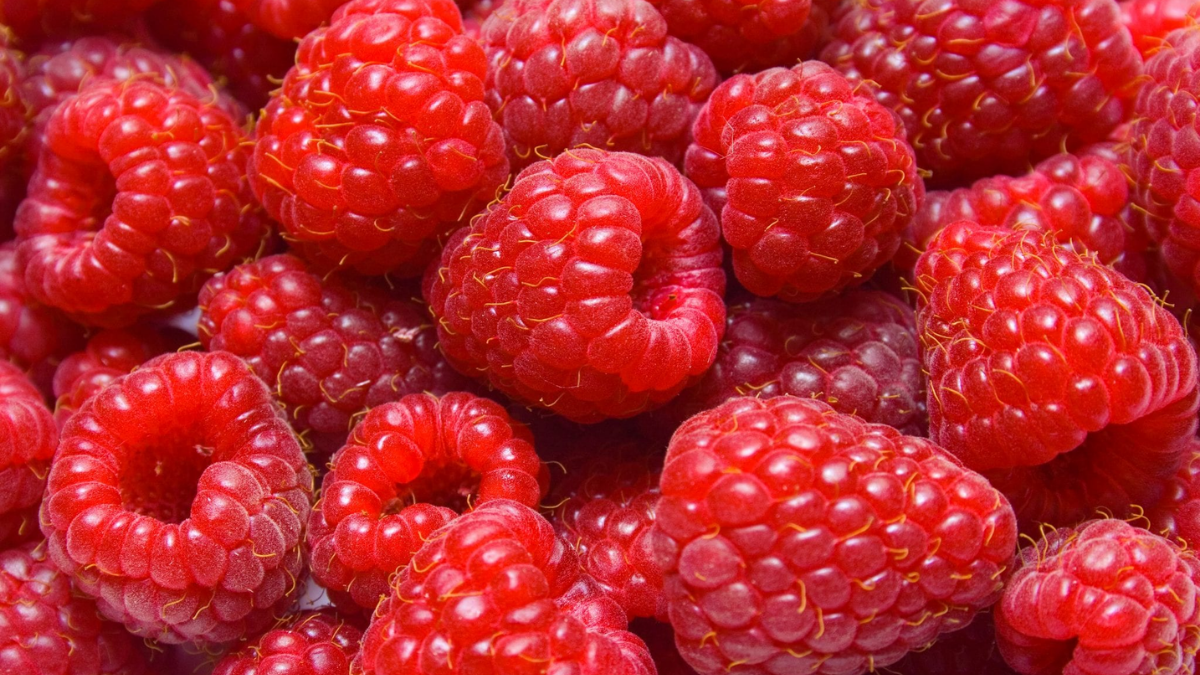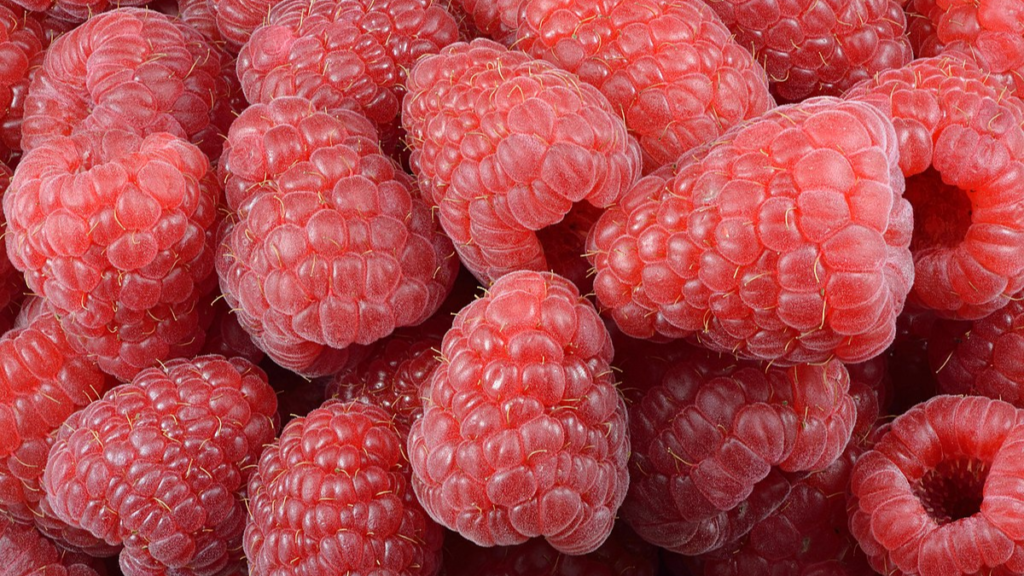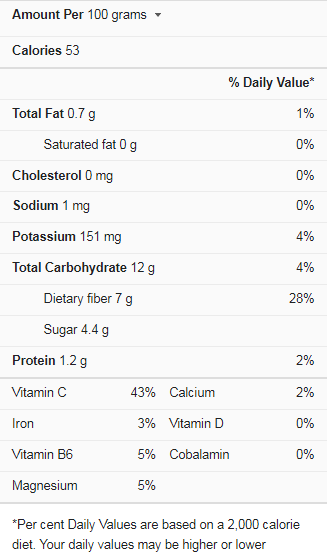Raspberries are a small, sweet berry with a sour flavor. Their bright color and excellent flavor may transform any regular meal into something memorable. Each raspberry is also high in vitamins, minerals, antioxidants, and fiber. Red, black, purple, and gold raspberries are the four colors available. The most frequent form of raspberry available in supermarkets is red raspberries. Fresh raspberries are accessible from June to October. However, frozen raspberries are available all year and have the same vitamins and minerals as fresh raspberries.
Raspberry Nutrition Facts
Raspberries’ Health Benefits
Raspberries are a great way to get a lot of nutrition in a small amount of space. They include potassium, which is necessary for heart function and has decreased blood pressure. Raspberries contain omega-3 fatty acids, which can help prevent stroke and heart disease. They also include manganese, an essential mineral for bone and skin health and blood sugar regulation.
Diabetes Management
Raspberry berries include 8 grams of fiber per cup, significantly more than other fruits in the produce section. Fiber can aid in the reduction of blood sugar, cholesterol, and blood pressure levels. Fiber-rich foods are more filling and keep you feeling fuller for longer after a meal so that they can aid weight loss. Raspberries have a lower sugar content than most fruits, with only 5 grams per cup, making them less prone to cause blood sugar spikes. Raspberries offer a sweet flavor to foods, which can help you lose weight and maintain your blood sugar levels by reducing your need to sweeten food with artificial preservatives.
Disease Prevention
Antioxidants found in raspberries help protect cells from free radical damage. Free radicals are unstable atoms that cause damage to your cells as they attempt to stabilize themselves. They may contribute to the aging process, arthritis, cancer, heart disease, Alzheimer’s disease, and various other diseases. Free radicals are stabilized by antioxidants, which render them harmless. Fresh raspberries are one of the best antioxidant foods you can eat. Most antioxidants are found in black raspberries, followed by red and golden raspberries. The more antioxidants a fruit contains the darker its hue.
Healthy Skin
Vitamin C is also found in raspberries, and it is necessary for the development of collagen, a protein that constitutes about 75 percent of your skin. Collagen production declines with age, resulting in wrinkles and drooping. Raspberries are high in Vitamin C, which may help protect and repair sun-damaged skin.
Brainpower
According to experts, eating a diet high in antioxidants can help the brain and nervous system stay healthy. Vitamins C and E have been shown to protect a person’s ability to think and recall knowledge as they age. These antioxidant vitamins can be found in raspberries. Discover which foods are high in antioxidants.
Heart Health
Anthocyanin’s, a type of flavonoid, have been demonstrated in studies to reduce inflammation, leading to cardiovascular disease. Raspberries contain anthocyanin’s as well. Antioxidants may reduce the risk of cardiovascular disease by preventing platelet aggregation and reducing blood pressure through anti-inflammatory processes. The American Heart Association recommends that most adults increase their potassium intake while lowering their salt intake. High blood pressure, a risk factor for cardiovascular disease, can be prevented with specific dietary changes. Potassium is found in 186 milligrams (mg) per cup of raspberries. The American Heart Association recommends ingesting 4,700 milligrams of potassium per day.
Cancer Prevention
According to the National Cancer Institute, Dietary antioxidants may help prevent the body from lung, esophageal, gastric, and other types of cancer. An extract of Meeker red raspberries was used to treat stomach, colon, and breast cancer cells in 2010, and the extract destroyed more than 90% of the cells. According to the researchers, antioxidants were responsible for around half of the cell death in breast cancer cells.
How Many Raspberries Per Day Should you Consume?
One of your five-a-day requirements is about 20 fresh berries. Check out our whole library of health benefits guides. From raspberry & polenta cake to raspberry tiramisu, our raspberry recipe collection will inspire you. According to OSU experts, a single serving of raspberries has a lot of health benefits. OREGON CORVALLIS – Researchers at Oregon State University discovered that eating the equivalent of one serving of red raspberries per day reduced weight gain in laboratory mice, even when they ate an unhealthy, high-fat diet. Eating more raspberries can help keep your digestive system running smoothly.
A cup of fresh raspberries has about eight grams of dietary fiber, which can help move things along in your digestive tract and reduce bloating and discomfort. A: Blueberries are the world’s healthiest berry in terms of vitamin value. Antioxidants, vitamins, minerals, and antioxidants abound in blueberries. Q: Which berry contains the most antioxidants? A: The antioxidant concentration in blueberries, cranberries, and blackberries is the highest of any berry.
Which is Healthier, Blueberry or Raspberry?
Raspberry and blueberry have similar calorie counts, with 52 calories per 100 grams for raspberry and 57 calories for blueberry. In macronutrient ratios, blueberries are higher in carbohydrates, lower in fat, and similar in protein to raspberries. Dietary fiber is abundant in both raspberries and blueberries. The sugar content of raspberries is 56% lower than that of blueberries. Raspberry contains more pantothenic acid and folate than other fruits, and raspberry is a high-quality source of vitamin C.
Doctors and nutritionists recommend these berries because they are abundant in antioxidants, phytoflavinoids, potassium, and vitamin C. They are anti-inflammatory and lower your chances of heart disease and cancer. Is it safe to eat raspberries for everyone? Raspberries contain salicylates and natural compounds like apples, peaches, avocados, and blueberries. Some persons are allergic to these substances and may develop a rash or swelling due to their exposure.
Are Raspberries Good for your Skin?
Because raspberries are abundant in antioxidants, they can help your skin seem younger and age more slowly. Red raspberries include anthocyanin’s, which are elements that help to retain youthful skin and a beautiful complexion. The anthocyanin content in raspberries can assist in brightening the skin and restoring its youthful appearance. You can try to eat raspberries daily to maintain your skin’s brightness and health.
Dark-colored berries, such as blueberries, raspberries, blackberries, and cranberries, are high in antioxidants and vitamin C, two nutrients that are essential for skin health and acne reduction. Raspberries, blueberries, and strawberries are delicious and beneficial to your skin, and berries are high in antioxidants and help protect your skin from the sun’s harmful rays. Furthermore, blueberries are vascular constrictors, which means they can assist persons with sensitive skin reduce redness.
Is it Necessary to Keep Raspberries Refrigerated?
Store raspberries dry and in the original container, they came in (or if they are from the garden, in a breathable container). Keep them out of the crisper or the coldest part of the fridge (typically the back). The most significant spot in your fridge is where you’ll see them the most, ensuring that you don’t forget about them. For 1-2 days in the refrigerator, raspberries are the juiciest, plump, and delicious if appropriately preserved. However, freezing your berries is the ideal solution if you want to store them for a more extended period.
Because raspberries are highly perishable and do not ripen after being picked, they should only be left out at room temperature if consumed the same day. Maintain Calm. Store raspberries dry and in the original container, they came in (or if they are from the garden, in a breathable container). Keep them out of the crisper or the coldest part of the fridge (typically the back).
Is the Sugar Content in Raspberries High?
Raspberries. Raspberry berries are among several great berries that made a list, with only five grams of sugar per cup and plenty of fiber to keep you full. Those who consumed the most raspberries had lower glucose concentrations than those who did not consume the berries. The findings demonstrate that as the number of raspberries consumed grew, those at risk of diabetes required less insulin to keep their blood glucose under control. Foods with a GI of 55 to 70 are considered intermediate, and foods with more than 70 are considered high.
Strawberries, blueberries, blackberries, and raspberries all have a score of less than 40. If you have diabetes, portion control is crucial to keeping your blood sugar. There’s even better news: other berries have a low glycemic index! Blueberries, blackberries, and raspberries are low-ranking 3s and 4s, so enjoy them.
Conclusion
Raspberries are a popular berry with a deep red color and a sweet, juicy flavor. Vitamins, minerals, and antioxidants are abundant in them. Raspberries come in various colors, from the traditional red and black to purple, yellow, and golden. Each berry color offers a different mix of vitamins, minerals, and antioxidants. The health benefits of red raspberry are discussed in this article. We go through raspberries’ nutritional value, incorporating them into your diet, and the potential health dangers.
Raspberries are berries that are related to blackberries and roses. They are essentially small bunches of reddish-pink droplets that are closely packed together, and they are grown in the UK between the summer and fall months. They have a tangy, sweet flavor.





